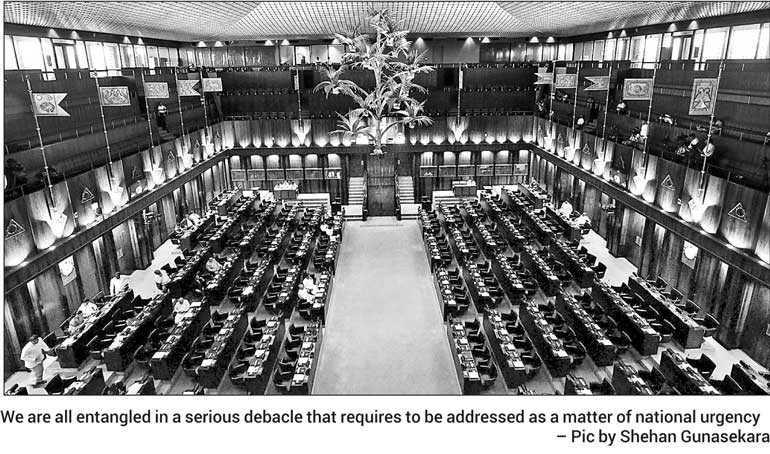Monday Feb 16, 2026
Monday Feb 16, 2026
Saturday, 8 December 2018 00:10 - - {{hitsCtrl.values.hits}}

 Since 26 October, following the political changes effected, the country has been witnessing a series of developments emerging, culminating into a crisis situation. The removal of the Prime Minister, appointment of a new Prime Minister and a Cabinet of Ministers, prorogation of the Parliament and the notice of dissolution of the Parliament have been at the bottom of the incitation to this state of affairs.
Since 26 October, following the political changes effected, the country has been witnessing a series of developments emerging, culminating into a crisis situation. The removal of the Prime Minister, appointment of a new Prime Minister and a Cabinet of Ministers, prorogation of the Parliament and the notice of dissolution of the Parliament have been at the bottom of the incitation to this state of affairs.
When we look back at the events in retrospect it becomes evident that the associated developments are the direct result of a vilified campaign to create a fracas leading to pandemonium. The episode first appeared as a pressure tactic towards an exhortation of a settlement favourable to the affected party. But unfortunately the modus operandi adopted by the former Prime Minister’s party far exceeded the warranted democratic norms. Therefore this vituperative campaign has caused irreparable damage to the country’s image as well as to the economy.
Whatever the posthumous outcome, we are all entangled in a serious debacle that requires to be addressed as a matter of national urgency to end an internal political strife fast spreading across in a cancerous profusion.
The last general election of the country failed to produce a government with a clear majority for any single party. Parties that secured larger number of seats in their warm up to form a stable government were compelled to overcome the possibilities of being outvoted with the passage of time due to instability.
The authors of 19th Amendment having foreseen this eventuality had taken a constitutional precaution by bringing in a new concept into the amended version by the creation of a National Government accommodating two or more parties to get the parliamentary majority to form a safe and stable cabinet.
The UNFGG which secured the highest number of seats as an alliance accordingly entered into an agreement with the SLFP a constituent of the alliance called UPFA, which secured the second highest number of seats as an alliance to form this National Government. It appears that there was no constitutional barrier for an alliance to form a NG with one constituent party of another alliance.
However the marriage did not last long as a vivacious blending due to several political and policy disagreements that kept on surfacing after a short time. The inevitable eruption came about immediately after the decision of the UPFA to withdraw from the National Government.
The instantaneous consequence was the automatic termination of the jumbo cabinet that existed by virtue of the constitutional provision to accommodate a number exceeding the 30 stipulated for a single party government. Resulting from this the cabinet stood dissolved, triggering the steps taken by the President in the immediate aftermath.
Now the quagmire the country is placed is that there is not a single group that holds a majority power in the Parliament. We have an ad-hoc grouping that has come together to put forward an opposition to the decisions taken by the President to appoint a new Prime Minister on the grounds that he does not have the majority support of the Parliament. Nevertheless the procedure they are engaged in to establish their claim is totally un-parliamentary and the ostensible demonstration of the strength of this grouping is misleading all.
Instead of disproving the fact that the new Cabinet and the PM does not command the confidence of the Parliament in the proper manner by bringing forward a NCM in accordance with the parliamentary practice and Standing Orders they have been trying to make out that there is a violation of the Constitution and thereby has caused some aberration. The central focus of the agitators has been to keep their party supporters from being demoralised on the one hand and to proliferate a wrongful picture in the International scenario.
It is a pity that they have resorted to this niggardly action unmindful of the serious damaging effect it has in consequence to the whole country. This cause of action taken by them cannot be upheld as justified by any means unless they were desperate without any feasible alternatives to air their grievances and to establish their stand and presumptions about the President’s opinion regarding the confidence of the Parliament. It appears that they were more interested in creating a mayhem than finding a solution.
Now we are not only embroiled in a huge controversy internally but also to certain undue influences to our economic freedom from external sources.
Therefore as citizens of the country who have the interest of the country as the prime concern beyond the parochial interests to remain in power as displayed by most of our politicians, we have to look for achievable alternate solutions to this crisis.
When we see the actual composition of the political parties comprising the 225 parliamentary seats today, a cabinet of a parliamentary government in which all political parties are represented would be the best option in the event the country cannot go for fresh elections immediately. When no single party on its own cannot have a majority in Parliament this would be the best option to have a government with a “high degree of political legitimacy and collective identity it desires and also playing a role in diminishing internal political strife.”
During times of crisis all parties get together to form coalition governments, all party coalitions or national unity governments sinking all other minor differences. We have seen such polarisations in the high echelons of democracy elsewhere. Global political history is full of such examples and precedents for us to follow. To quote a few examples of coalitions we have the case records of Australia, Belgium, Canada, Finland, Denmark, India, Ireland, Japan, Newz Zaland and Israel among several others. Great Britain which we often quote as the Godfather of Westminster system to emulate is full of examples of national and coalition governments formed during highly critical periods in their political history.
It is generally accepted that coalition governments secured by groups of political parties shedding their king maker inclinations lead to more consensus-based politics agreeing to compromise on broad government policy. Internationally too other than the parties with vested interests and ulterior motives such a government would reflect a better outlook for exhibiting the prevalence of the rule of law and democracy.
Now let us take a realistic view of our own situation. The 2015 August election was held in a completely different new environment immediately after the dissolution of a coalition government and a contest between the constituents of that same polarisation. The results were as follows:
UNFGG – United National Front for Good Governance was the alliance that secured the largest number of seats in that Parliament with a total of 106 seats.
The UPFA came as the runners-up alliance securing a total of 95 seats. The Tamil party alliance obtained 16 parliamentary seats. The JVP got six sets while EPDP and SLMC obtained one seat each
When we tabulate the result showing the composition of the contestants and the national seats they secured the picture becomes clearer.
As the political parties have not changed their individual identity in continuing under the respective alliances, each party can be taken as a separate entity for the coalition purposes and brought into the broad national coalition. According to the proportional representation of parties all parties could be allocated ministerial portfolios in the cabinet, as deputies and state ministers while considering the parliamentary seniority for the cabinet and other ministerial posts. As such a government can fit into the constitutionally provided National Government concept the number of cabinet and other ministerial portfolios could be determined by the Parliament.
If they love the country and if the parliamentarians are desirous of shedding their petty differences for power this would be the best solution for the country which cannot be disputed by either internally or externally. If some party or group is more influenced by foreign or other unseen interests they may not fit into this combination. In such an event they may be dropped and continued with the others who consent in national interest.
(The writer is Member, Colombo Municipal Council; former SLFP Organiser, Mirigama Electorate; former Chairman, Bank of Ceylon; former Chairman, National Gem and Jewellery Authority; former President, Ceylon Bank Employees Union.)
